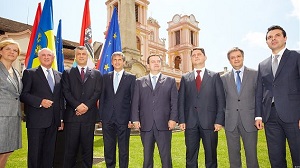By Erisa Nuku
Staff Writer
Fourteen years have passed since NATO bombed Serbia in response to the ethnic cleansing of the Albanian population in Kosovo by Serbian leader Slobodan Milošević. In April of 2013, both countries reached a landmark agreement, which will make it possible for them to pursue their Euro-Atlantic dream.
Looking into the past
The conflict between Kosovo and Serbia dates back centuries ago. According to Albanian history, the Kosovars are descendants of the Dardanians, who were present in the area long before the time of Christ. On the other hand, the Slavs, who started coming to the Balkans in the 5th century, disagree claiming that Kosovo was always a part of Serbia. Both countries were part of the Ottoman Empire until the 18th century, but Kosovo was a separate administrative district at the time.
Nevertheless, conflict between Kosovo and Serbia escalated in the late 1940’s when Kosovo refused to join the newly formed Socialist Federal Republic of Yugoslavia. Despite the armed resistance of the Kosovars, Yugoslav leader Josip Broz Tito managed to integrate Kosovo in the new federation. Former Yugoslavia was comprised of six socialist republics (Bosnia and Herzegovina, Montenegro, Macedonia, Croatia, Serbia and Slovenia) and two autonomous provinces (Kosovo and Vojvodina). Over time, under Tito’s rule Kosovo gained more autonomy.
Under the constitution of 1974, the group was granted the right to become members of the Parliament of Yugoslavia, and have their own assembly, judicial system, and hold a referendum. However, with the death of Tito in 1980 and the rise to power of Slobodan Milošević in 1986, the 1974 constitution was abolished.
The other Yugoslav republics did not welcome Milošević’s platform, which was focused on creating a “Greater Serbia”. The breakup of Yugoslavia in 1991 was a result of political tension and disagreements in the region and was accompanied by bloody wars in Croatia, Bosnia and Herzegovina and finally Kosovo. In 1998, thousands of Kosovars fled to neighboring Albania in an attempt to escape the ethnic cleansing of Milošević’s forces. The massacres of children and women by the Serbians led to the NATO air strikes against Serbia which caused the retreat of Milošević.
Ultimately, Kosovo was governed by the United Nations until it declared its independence in 2008. As of 2013, 105 countries recognize it as independent. Serbia, however, has not yet recognized it. Its close ally, Russia, a member of the Security Council, has also blocked Kosovo’s request to join the United Nations.
Looking forward
On April 19th, 2013 after continuous talks under the mediation of EU High Representative Catherine Ashton, Kosovo’s Prime Minister Hashim Thaci and his Serbian counterpart Ivica Dacic reached a landmark agreement in Brussels. Both countries aspire to join the European Union and NATO, and this deal clears the way for their Euro-Atlantic future.
The agreement states that while Serbia does not officially recognize the independence of Kosovo, it acknowledges the fact that Kosovo holds legal power over the whole territory. The disputed areas of Northern Kosovo that have an ethnic Serbian majority will retain some autonomy in that they will helped determine who will be the commander of the northern police forces, and a Serbian association will be set up to cover healthcare and education.
The agreement was met with protests in both Serbia and Kosovo. Serbs of the North stated that they wanted to break away from Kosovo. However, Kosovo’s Prime Minister Thaci addressed the parliament, stating that: “The road to independence is irreversible and the process of normalizing relations between the two independent countries is unavoidable.”
The implementation of this agreement will certainly pose difficulties. A UN envoy recently stated that there has been fundamental progress in the past months and that the provisions of the agreement are being carried out. With Kosovo’s local elections coming up in early November, some problems have arisen. The Serbs in the North find it unacceptable for the ballot paper to contain the national symbols of Kosovo. It is yet to be seen how Kosovo’s government will react.
Nevertheless, it is important to keep in mind that the agreement is a win-win situation for both countries, one which will not only enable them to move forward, but will also improve the regional stability and cooperation in the Balkans.
Erisa Nuku, class of 2015, is a Law and Politics major from Tirana, Albania.


This article is very informative. I really liked it! Great job!
Very accurate description of the issue in the Balkans